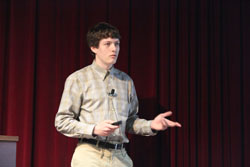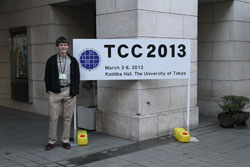HMC First-year Presents Paper at International Cryptography Conference
March 15, 2013Harvey Mudd College student Amzi Jeffs ’16 presented his research on cryptography at the 10th annual Theory of Cryptography Conference (TCC 2013), March 3-6 in Tokyo.
The paper, “Characterizing the Cryptographic Properties of Reactive 2-Party Functionalities,” was co-authored with Mike Rosulek, assistant professor of Computer Science at the University of Montana.
Jeffs and Rosulek researched secure computation, a subfield of cryptography in which two parties perform joint computations without revealing their inputs to each other.
“Imagine two people want to determine who has more money, but don’t want to reveal how much money they have,” said Jeffs. “We want to answer the question of how they can interact so that they get a correct answer, but neither one knows how much money the other has.”
Jeffs and Rosulek looked at computation tasks and created a decision process that can determine whether a task can be carried out securely. Previous work on this topic addressed only simple tasks that use one set of data to compute one set of results. The new work addresses tasks that have several rounds of data inputs and outputs; these are more general tasks that process private information iteratively and selectively over time. Jeffs’ and Rosulek’s new results add to our understanding of how persistent information can be maintained, updated, kept secret and computed upon.
“Our result is purely theoretical,” said Jeffs. “That is, its purpose is not to provide some specific application to the real world, but to expand the general understanding of cryptography.”
Jeffs became interested in cryptography during his senior year of high school while taking computer science theory classes at the University of Montana, Missoula. At the recommendation of Rosulek, he signed up for a cryptography course and enjoyed it immensely.
Following high school graduation, Jeffs spent the summer of 2012 doing research with Rosulek that culminated in the invitation to present at the TCC 2013 in Tokyo.
“Amzi was able to get up to speed very quickly and familiarize himself with the prior work in this area,” said Rosulek. “He developed a great intuition about the nature of the problem and had some very productive insights that eventually led to the final result.”


